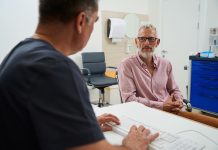Petronille Bogaert & Herman Van Oyen, on behalf of BRIDGE Health, explain the challenge of creating an EU health information system and how an ERIC can help
A healthy population is a prerequisite for economic productivity and prosperity. EU member states share the ambition of improving citizens’ health, providing optimal prevention and universal access to safe, effective and efficient healthcare in a financially sustainable way. Population ageing, technical innovations in health care and growing citizen expectations increase the pressure on health systems. At the same time, EU economies continue to experience low growth rates and find it difficult to afford increases in health expenditure simultaneously with growing demands for healthcare. To make the most of health spending and investments at EU and Member State level, health policy and decision making must be based on robust evidence in the form of high quality and timely data on population health and systems, as well as thorough research outcomes.
More and better health information is needed throughout the EU
Accordingly, the EU and its Member States need timely, sound, and high-quality health information (such as comparable and policy-relevant indicators on population health and health system performance) to support policy making, strengthen programme action and improve individual and population health outcomes. However, at present, there are three main challenges to ensure the availability and use of health information for policy-making and research.
1. Much of the gathered evidence and knowledge is dispersed, incomplete in important areas, and difficult to access. A good example is the limited data on non-communicable diseases, even though they are the main cause of death and poor quality of life in the EU. Better health information governance is needed to ensure that the data we collect and knowledge we generate reflect our priorities.
2. Large differences can be found in terms of quality and, as a consequence, comparability of health information between and within EU countries. This makes it difficult to learn from each other. Moreover, health information tends to be poorest in areas where health itself is poorest. This does not even allow to assess the full magnitude of health inequalities across the EU, let alone to identify appropriate, targeted action. Better support and coordinated action is required to reduce health information inequalities across the EU and improve the quality and comparability of the collected data.
3. Under the lead of Eurostat, the European Statistical System provides a solid working basis for gathering and providing health data. Beside this however, a wide range of health information activities are often funded through ad hoc projects as opposed to more sustainable structures. This lack of research continuity results in lost expertise, data collection mechanisms, research capacity, and networks. Mechanisms are needed to feed the knowledge and know-how generated by these projects into more permanent data collections.
The solution: Creating a European Research Infrastructure Consortium (ERIC) on Health Information
Both the European Commission and the Council of the European Union have already expressed the wish to examine how an improved alignment of health information activities at an EU level would function. This gave rise to the BRIDGE Health project which examined the establishment of a “sustainable and integrated EU health information system”, as requested by the Council of the European Union. After thorough analysis, BRIDGE Health concluded that the creation of a European Research Infrastructure Consortium (ERIC) to collect, process, analyse, report, and communicate health information can overcome these obstacles and can facilitate the governance of health information activities in the EU in a way that best supports evidence-based health policies and investments.
The European Research Infrastructure Consortium on Health Information would be able to:
- Coordinate health data collection and analysis as informed by health policy priorities;
- Facilitate research on health indicators and population health and provide technical support to Member States;
- Effectively support policy and decision-making and strengthen programme action in a coherent and sustainable way.
These are based on an overall aim of improving individual and population health outcomes. Implementing the European Research Infrastructure Consortium on Health Information at EU level would represent a major step forward in supporting EU Member States and European Economic Area countries in their evidence based policy-making. The outputs of the Consortium in terms of better and more relevant knowledge on population health and health systems could be used to provide benchmarks, define policy ambitions and set realistic targets.
What to expect from a European Research Infrastructure Consortium (ERIC) on Health Information?
An ERIC serves us in multiple ways:
- An ERIC operates under strict Member State governance, therefore it is tailored to their needs and priorities. It works with, through and for its members. It supports Member States in their actions in health both at national level and at EU level e.g. in the context of the European Semester.
- The ERIC is at the core of health information activities in the EU providing a contact point for Member States, and responding to specific requests by competent national authorities. It builds on existing structures and their knowledge by bringing key players together whilst representing the interest of its members. It will function as a network of networks, linking sets of national and international experts and research facilities and thereby providing clear, valid, coherent and comparable health information in ways that is most useful for policy makers. The ERIC will not do what other stakeholders already do, but liaise and guide researchers to available and comparable data.
As such, the ERIC:
- Generates knowledge that is valid, coherent and comparable. It fills the gaps where data collection is lacking and analyses comparable datasets from EU Member States. This will prevent work from being duplicated and reduce both inefficiencies and costs.
- Manages knowledge for better access to data through virtual and integrated platforms and by guiding users to (meta)data and help them in their use.
- Exchanges knowledge by enhancing best practice exchange between Member States and support mutual learning by focused capacity building. It will support more and stronger health research networks and communities.
- Translates knowledge of health research outcomes to the general public and policy makers and enable researchers to optimise their research output to better suit target groups.
- The ERIC has a legal status and available expertise to benefit from relevant EU funding opportunities at a comparatively low cost to its members utilising economies of scale and scope.
- The ERIC carries out horizon scanning activities to detect early signs of important developments including new technology and its effects on the issues at hand. It also explores persistent problems and trends in population health and health systems. This will allow the ERIC to guide Member States in designing work plans and setting priorities in health policy.
On 20 April 2017, BRIDGE Health is organising a meeting entitled “Health Information in the European Union – the ERIC as a tool” in Brussels at the Royal Library of Belgium. Participation is free, but registration via the BRIDGE Health website is mandatory.
(When referring to Member States in this document all EU Member States and EEA countries are included)
Petronille Bogaert
Project Researcher
Herman Van Oyen
Director
Scientific Institute of Public Health Belgium
Tel: +32 2 642 57 48
bridge.coordination@wiv-isp.be
Please note: this is a commercial profile











